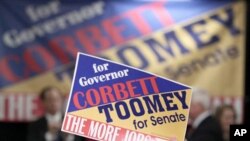History shows that the party holding the White House usually loses congressional seats in a new president's first midterm election, and the polls and political experts certainly point to that on Tuesday.
In fact, a number of well-respected political analysts now predict that Republicans will likely win more than 50 seats in the House of Representatives currently held by Democrats, easily putting them past the threshold of the 39 additional seats they need to retake control of the House of Representatives. All 435 House seats will be at stake, but experts say only about one-quarter are truly competitive.
Republicans are also expected to make gains in the Senate, but most experts say they will likely fall short of gaining the 10 seats they need to reclaim a majority there. This year, 37 of the 100 Senate seats are up for election.
Final campaiging
Leaders from both parties were trying to rally supporters in the final hours of the campaign, including President Barack Obama who spoke in his home state of Illinois.
"If everybody who fought for change in 2008 shows up in 2010, we will win this election," declared the president.
Republicans expect to benefit from public-opinion polls showing Americans are worried about the economy and jobs and ready for change in Congress.
Former Republican Congressman Dick Armey has been busy as an organizer of the conservative and libertarian Tea Party movement for the past year, a grassroots group that is expected turn out in big numbers for Republican candidates on Election Day.
"The Republican Party, bless their heart, finally learned in this last year to listen to America," said Armey," and that is why the Republican Party is going to win!"
Republicans lost control of Congress to Democrats in the 2006 midterm elections and Democrats bolstered their majorities in the 2008 election when Mr. Obama won the presidency.
The force of a bad economy
The poor domestic economy has opened the door to a Republican resurgence in Congress this year, says University of Virginia political expert Larry Sabato.
"Look, 39 seats, which is what they need to take over, seemed difficult to impossible a year ago," Sabato points out. "And now they are on the verge of a comfortable retaking of the House after just four years of Democratic control."
Tuesday's election could have huge political stakes for President Obama and his next two years in office. Republican control of one or both houses would make it easier for Republicans to block domestic initiatives, and could give congressional Republicans a more influential voice on foreign policy, including the war in Afghanistan.
Republicans may begin focusing on cutting the budget and repealing President Obama's health-care law once the new Congress is seated in January, says Thomas Mann, a political scholar at the Brookings Institution in Washington.
"The economy is in tough shape and so it means we are going to have some pretty aggressive Republicans coming to town, some associated with the Tea Party, who are going to raise some hell and try to repeal some programs passed under President Obama in his first two years," Mann says.
In addition to the House and Senate races, 37 of the 50 states will hold elections for governor, and the experts predict that several new Republican governors will be inaugurated in January as well.




